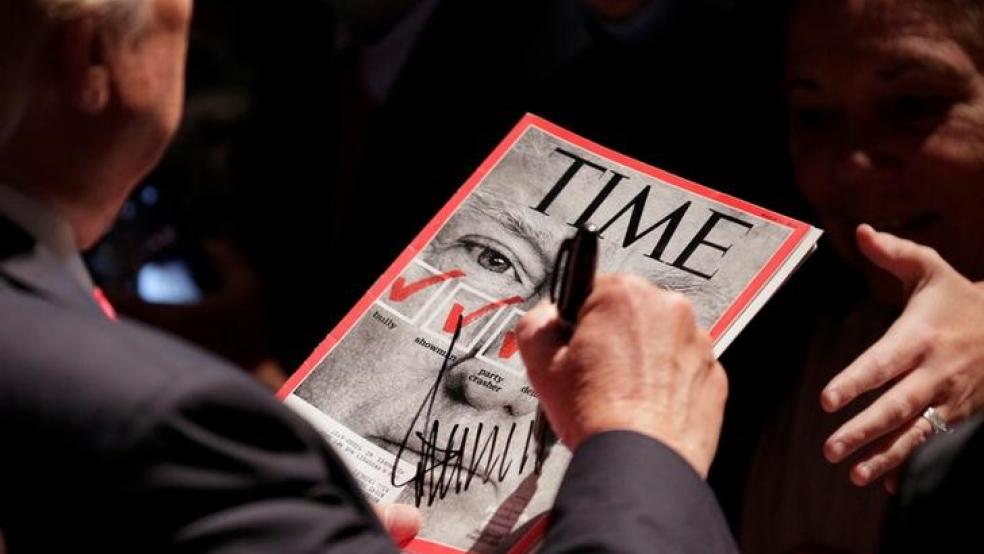Usually, when Donald Trump goes into ALL CAPS mode on Twitter, it’s to stress an adjective that he wants to apply to one of his opponents, or to a media organization he’s displeased with. A flailing opponent is “SAD!”, an unflattering article about him is “BAD!”
But unlike many of his social media rants, which seem like Trump just letting his id off the leash for a good run, his tweet last night denouncing a deal between Texas Sen. Ted Cruz and Ohio Gov. John Kasich to deny him the Republican presidential nomination as an act of “DESPERATION!” actually looked like pretty solid analysis.
Related: Ted Cruz Punches Down at the Transgendered
Not long before, both the Cruz and Kasich campaigns released statements reporting that the candidates had agreed on a strategy that would allow Cruz to compete against Trump in Indiana without interference from Kasich, and Kasich to focus on Oregon and New Mexico without competition from Cruz. (Oregon and New Mexico, combined, have almost the same number of delegate available as Indiana.)
“Having Donald Trump at the top of the ticket in November would be a sure disaster for Republicans,” said Cruz campaign manager Jeff Roe. “Not only would Trump get blown out by Clinton or Sanders, but having him as our nominee would set the party back a generation. To ensure that we nominate a Republican who can unify the Republican Party and win in November, our campaign will focus its time and resources in Indiana and in turn clear the path for Gov. Kasich to compete in Oregon and New Mexico, and we would hope that allies of both campaigns would follow our lead.”
In a similar statement, Kasich communications director John Weaver said, “Donald Trump doesn’t have the support of a majority of Republicans — not even close, but he currently does have almost half the delegates because he’s benefited from the existing primary system. Our goal is to have an open convention in Cleveland, where we are confident a candidate capable of uniting the Party and winning in November will emerge as the nominee.”
Both candidates said that they would plan to compete as usual in the other states that remain on the primary calendar. However, with both mathematically eliminated from the race for a first-ballot nomination, their focus has now plainly shifted away from winning states and toward stopping Trump from earnings enough delegates to win the nomination outright.
Related: Trump Just Showed Why His Top Adviser’s Job Is Nearly Impossible
The problem is that while organized efforts to thwart a surprisingly successful frontrunner aren’t unheard of in presidential politics, they rarely work out well.
Pat Buchanan, the conservative firebrand who once worked as a speechwriter for Richard Nixon, said that at one point the former president told him, “Buchanan, if you ever hear of a group getting together to stop X, be sure to put your money on X.”
Nixon spoke from experience. He had been sucked into an effort to short-circuit the insurgent candidacy of Arizona Sen. Barry Goldwater in 1964. The effort failed (though Nixon wound up as a highly effective advocate for Goldwater), but its existence created a level of bitterness within the party that contributed to Goldwater’s epic loss to Lyndon Johnson later that year.
In 1976, the Democratic Party establishment lined up against Jimmy Carter, the relatively unknown first-term governor of Georgia. The so-called ABC movement, for “Anybody But Carter” sent a wave of more mainstream candidates against Carter, but none survived. Carter went on to win the White House against Gerald Ford, the former Nixon vice president who had barely survived a primary challenge from Ronald Reagan.
Related: Why Candidates Need the CIA, NSA and Their Mother to Vet Their Veep
The Cruz-Kasich alliance may, at this point, be the only shot at preventing Trump from amassing the 1,237 pledged delegates he would need for a guaranteed first-ballot nomination at the GOP convention in July. But it’s a high-risk strategy — sort of like a hockey team pulling the goalkeeper off the ice in the final seconds of a close game. It gives the team more power on offense, but leaves a gaping vulnerability on defense.
Maybe Cruz can take a big chunk of the vote in Indiana, denying Trump some of the state’s 57 delegates. He currently trails the billionaire by about six points in the Hoosier state. It’s not clear whether Kasich can do well in either Oregon or New Mexico, as neither state has been polled recently.
What’s obvious, though, is that the “collusion,” as Trump calls it, between his two remaining opponents plays right into the narrative the Trump campaign has been maintaining for weeks. The party elites can’t beat him straight up, so they are resorting to trickery and technicalities instead. If Trump can successfully convince voters in Indiana that they are at ground zero of the latest attempt to “rig” the election, the Cruz-Kasich plan may achieve exactly the opposite of the result it intends.





